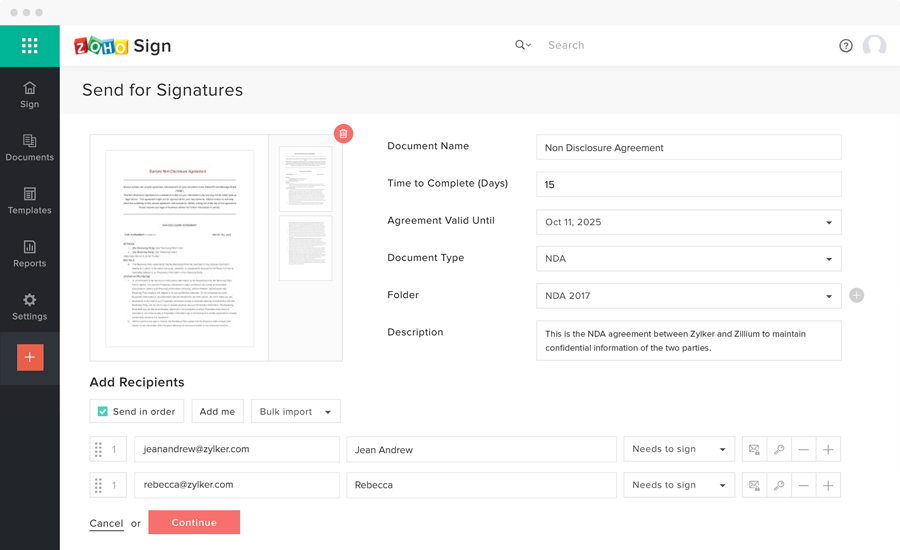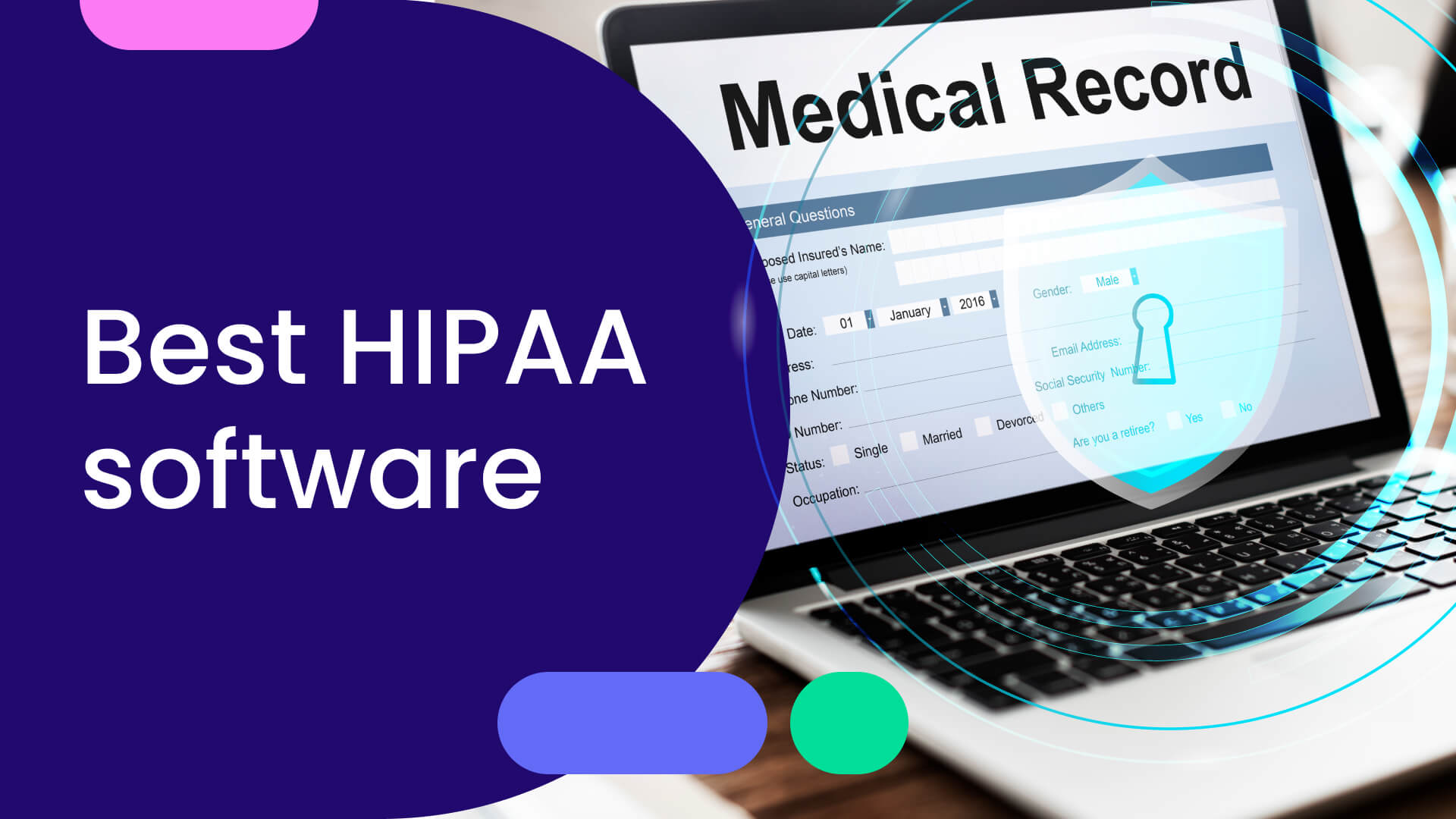AI is changing the game in LegalTech - fast. If you’re still using outdated workflows or relying on clunky templates, you’re falling behind. Document security and privacy aren’t optional anymore. Legal teams handling PII, PHI and financials need tools that do more than move fast—they need platforms that lock things down.
Here’s your 2026 cheat sheet: the 20 best software for legal documents, judged by what matters—security, automation and how well they actually hold up under pressure.
The 20 best software for legal documents in 2026
1. Clio: Best all-in-one case management
Clio is one of the most trusted names among the legal document software. It does more than just handle legal docs—it pulls together case management, billing and client communication in one place.

Why legal teams choose it: Everything’s connected—contracts, court filings, billing—so it’s easier to stay on top of things. Built-in templates cut down on repeat work, and the client portal keeps email chains short and responses quick. Plus, it integrates with Redactable, so you can manage and redact sensitive docs without leaving the platform.
Best for: Law firms of any size that want all-in-one software to handle legal docs without jumping between tools.
User-reported weak spots: Automation can feel a bit rigid, with limited options to tweak templates. Sometimes third-party syncs act up, and support can be slow to respond.
2. DocuSign CLM: Best contract lifecycle software
DocuSign CLM is a go-to legal documents software for in-house teams handling lots of contracts. It covers the full contract lifecycle—drafting, approvals, signatures and renewals—all in one place.

Why legal teams choose it: CLM cuts the busywork out of contract management. Clause selection, routing and eSignatures are automated so deals don’t stall. When speed matters, it gets the job done.
Best for: Legal ops teams that need a structured, enterprise-grade workflow tool.
User-reported weak spots: Setup takes time, and the learning curve is real. Some users report bugs and limited flexibility with custom contract processes.
3. NetDocuments: Best document governance and compliance
NetDocuments is built for legal teams that need tight control over who can access, edit and keep what. Unlike generic cloud software, it puts security and audit trails front and center.

Why legal teams choose it: No one wants a version control mess. NetDocuments keeps things tight with encryption, detailed permissions and audit trails built in—perfect for firms dealing with heavy regulations.
Best for: Large firms or government legal departments focused on compliance, security and document governance.
User-reported weak spots: New users might struggle with the interface, and search can lag with big files. Mobile access isn’t as strong as desktop.
4. Redactable: Best software for document redaction and PII protection
Redactable does what most software for legal documents don’t—secure redaction that actually holds up. It wipes sensitive data for good, scrubs metadata and logs every redaction for audit. Bonus: It plugs right into Clio.

Why legal teams choose it: When a missed redaction can mean a breach or a lawsuit, Redactable takes the risk off your plate. It’s fast, web-based and built for non-tech teams handling high-stakes documents.
Best for: Firms working with PII, HIPAA data or court files that need certified redaction.
User-reported weak spots: Not built for general doc creation. Collaboration and markup tools inside the editor are limited.
See how easy it is to keep legal documents safe—try Redactable for free today.
5. Legito: Best high-volume automation software
Legito takes the pain out of repetitive documents drafting. Software's smart templates use conditional logic to auto-adjust based on user input—great for firms or in-house legal teams that need to scale fast.

Why legal teams choose it: If you’re churning out NDAs, HR agreements or client forms, Legito helps you do it without errors or copy-paste mistakes. Smart templates adjust in real time based on client data.
Best for: Teams generating lots of contracts or internal docs that follow set patterns
User-reported weak spots: The template editor can be clunky, and some users report hiccups with logic and slow feature updates. Support docs are a bit thin.
6. PandaDoc: Best lightweight software for client-facing documents
PandaDoc isn’t a tool made just for lawyers—but it’s fast, flexible and gets the job done. If you’re sending tons of NDAs, intake forms or engagement letters, it’s an easy way to keep things moving.

Why legal teams choose it: It’s fast and simple. The drag-and-drop builder is easy to use, and real-time alerts keep you in the loop on opens and signatures. Great for onboarding or quick partner docs without the hassle.
Best for: Legal firms that need quick, client-ready docs without heavy formatting.
User-reported weak spots: Slows down with large files, limited offline access and eSignature security isn’t as strong as enterprise tools.
7. Zoho Sign: Best affordable eSignature and legal document handling
Zoho Sign nails the eSignature basics without the bloated price tag. For solo lawyers or small firms, it’s compliant, affordable and gets the job done.

Why legal teams choose it: This software for legal documents is mobile-friendly, plugs into the Zoho ecosystem, and works well for simple agreements and everyday approvals—no fluff, no jargon.
Best for: Budget-conscious teams that need quick, no-fuss signing with light automation.
User-reported weak spots: Occasional delays in sending signatures, limited branding options, and weaker integration outside the Zoho suite.
8. Everlaw: Best for litigation support
Everlaw is built for litigation sprints. From discovery to trial prep, it helps legal teams stay on top of case data without getting buried.

Why legal teams choose it: AI-powered review and real-time collaboration help legal teams move fast without missing details. Plus, Everlaw’s storytelling tools let litigators build arguments right from the documents.
Best for: Litigation teams that need secure, scalable legal document review and production.
User-reported weak spots: Pricey for smaller teams, can slow down with huge data sets and some advanced tools take time to learn.
9. ContractPodAi: Best AI-powered contract management
ContractPodAi helps legal teams get out of the weeds. It uses AI to manage contracts from intake to tracking, flag risks and speed up reviews.

Why legal teams choose it: The AI spots risky clauses, tracks compliance and even answers questions through a chatbot—great for teams buried in complex, high-volume contracts.
Best for: In-house legal teams managing lots of contracts with detailed terms.
User-reported weak spots: Takes time to set up properly. Some users report slowdowns and spotty support during busy times.
10. Ironclad: Best workflow-centric CLM
Ironclad is for legal teams done with email tag. Its no-code, visual workflows make contract creation and routing way easier.

Why legal teams choose it: Legal documents software for everyone—legal, sales, procurement—knows what’s next and who’s up. No more bottlenecks or confusion.
Best for: Legal teams supporting sales, procurement and HR.
User-reported weak spots: Reporting isn’t very flexible, setup takes work and mobile features lag behind desktop.
11. Juro: Best browser-native contract platform
Juro is a sleek, browser-based platform that replaces messy Word and PDF documents by handling contract creation, negotiation, and eSignatures in one place.

Why legal teams choose it: Legal and business teams work in the same doc, in real time—no version issues, no endless email threads.
Best for: Fast-moving startups and tech companies looking for sleek, fast CLM.
User-reported weak spots: The editor struggles with complex formatting, can be sluggish on large templates, and sometimes glitches with integrations.
12. Luminance: Best for AI-assisted document review
Luminance uses machine learning to speed up due diligence and document review, especially in M&A and investigations.

Why legal teams choose it: Legal documents software's AI spots anomalies, groups similar docs and cuts review time—perfect for firms facing huge piles of documents on tight deadlines.
Best for: Firms handling high volumes of complex legal documents.
User-reported weak spots: Requires significant training to hit high accuracy. Pricing can be steep for smaller teams.
13. Miratech HotDocs: Best for complex legal document assembly
Miratech HotDocs handles intricate, logic-heavy legal documents with ease. Think wills, trusts, regulatory filings.

Why legal teams choose it: It converts dense, rule-based paperwork into scalable digital forms—set it up once and you’re good to go every time.
Best for: Legal teams creating high-stakes documents with repeatable elements.
User-reported weak spots: Interface feels outdated. Learning curve is steep for building advanced templates.
14. Rocket Matter: Best for small firm management
Rocket Matter is a software for legal documents that bundles practice management, billing, and docs tools into one easy platform for small firms.

Why legal teams choose it: It connects legal documents to everything else—cases, calendars, bills—so nothing slips through the cracks. Solo attorneys especially like the streamlined dashboard.
Best for: Solo attorneys and small practices.
User-reported weak spots: Workflow customization is limited. Billing isn’t always flexible for non-standard fees.
15. Xakia: Best for reporting and legal team insights
Xakia brings clarity to legal operations with dashboards, matter timelines and document tracking.

Why legal teams choose it: It’s a reporting-first platform. Legal leaders use it to track document status, legal spend and team performance in one view.
Best for: Legal departments focused on data-driven performance.
User-reported weak spots: Document creation tools are basic. Dashboards can feel overwhelming without onboarding.
16. Onit: Best for enterprise legal management
Onit helps complex legal departments build detailed, automated workflows.

Why legal teams choose it: The platform’s business process automation (BPA) tools let you customize everything—from how legal documents flow to how compliance is tracked.
Best for: Corporate legal teams needing a highly customizable enterprise platform.
User-reported weak spots: Setup is complex and resource-heavy. Custom updates can disrupt existing workflows.
17. iManage: Best for legal knowledge management
iManage software organizes legal documents and work product across teams, with a focus on security and collaboration.

Why legal teams choose it: iManage uses AI to find and suggest relevant past work, helping lawyers reuse winning documents and cut duplication. Plus, advanced search and audit trails keep compliance tight.
Best for: Firms with distributed teams needing centralized, searchable workspaces.
User-reported weak spots: Search speed lags with large libraries. Integration can be finicky.
18. LinkSquares: Best for post-signature contract analytics
LinkSquares handles what most platforms for legal documents ignore—what happens after contracts are signed.

Why legal teams choose it: Its AI extracts key dates and clauses from signed agreements, letting you track obligations without juggling spreadsheets.
Best for: Legal departments managing thousands of executed contracts.
User-reported weak spots: Pre-signature drafting is limited. Reporting customization is a frequent complaint.
19. Agiloft: Best open-source CLM software
Agiloft brings flexibility to contract management, with open-source logic and deep configuration.

Why legal teams choose it: With this software for legal documents you can customize almost everything—without paying for proprietary licenses. Power users love its adaptability.
Best for: Legal and procurement teams needing tailored CLM without vendor lock-in.
User-reported weak spots: Takes time to implement. Interface can feel crowded.
20. Concord: Best software for contract collaboration
Concord keeps the entire contract process—from drafting to approval—in one place.

Why legal teams choose it: Real-time editing and unlimited eSigning make it ideal for legal teams that need to move fast without document's version chaos.
Best for: Growing businesses needing contract visibility across departments.
User-reported weak spots: Template management is clunky with large libraries. Complex approval workflows may require workarounds.
Read also: How to redact legal documents
Conclusion
Legal tech is moving fast. You can’t afford to fall behind. AI is already reshaping how lawyers draft, review and manage legal documents. Meanwhile, laws like GDPR, HIPAA, and CCPA are raising the bar on data security. And with hybrid work here to stay, flexibility and automation are no longer optional—they’re expected.
Legal documents aren’t just files. They’re evidence. Obligations. Liabilities. Choosing the right software for legal documents isn’t just about saving time—it’s about protecting your clients and your reputation.
That’s where Redactable comes in. Most software stop at visual redaction. That’s not enough. You need full removal, trackable edits and audit-ready security. Whether it’s court forms or trial evidence, use software built for what actually matters.
Don’t wait for a data breach to modernize your stack. Try Redactable for free and see how fast secure can be.







